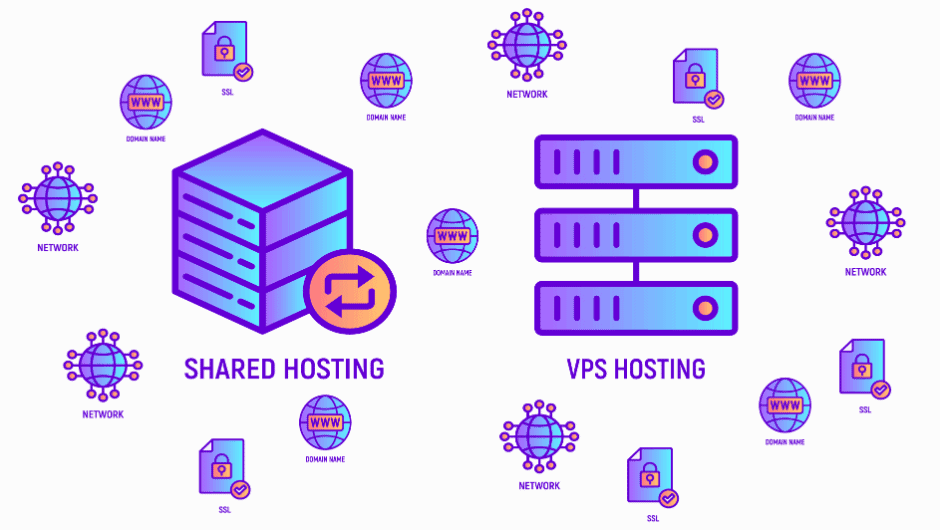
Some websites depending on the nature of the business need resources, some – speed performance, others – may not need nothing at all. They just need a place to host their website what is usually are very simple websites with simple design and content . How do you know which hosting plan is the best option for your business?
In this article I want to discuss the fundamental difference between the two most popular hosting types – Shared hosting and VPS hosting. Which option is better in a particular case.
1. Resources
Shared hosting is just what is sounds like. There’s a lot of sharing going on and in many aspects. One them are resources such as bandwidth and performance materials.
As you host your website using a shared hosting option, you share the data with every website that’s on the same server. So, if your “neighbor” gets more traffic than usual, expect your own site to start lagging. While it’s by far the cheapest option, it’s the most dependent on others.
A VPS option, on the other hand, is a far more flexible option than a shared one. In this case you get to host your website on a server with only a few of the others.
While the price is significantly higher, it’s a far better for those looking to have more control over their resource management and having better performance in general.
g.
In summary: a VPS is a more expensive option, but can offer more resources and far less limitations when it comes to available performance data for use. Then again, if you’re website is small and acts more as a business card (more for presentation than functionality) a shared option will be more than enough..
2. Functionality and Performance
You can probably guess but more resources means more flexible performance and functionality. With a shared hosting option you only get us as much performance as your hosting provider allows you to have. If they have don’t have SSDs or up-to-date caching software, you’re website might struggle in terms of speed.
Considering that other website’s on the same server will consume some resources for their own performance needs, this economical option might not work for you.
With VPS, on the other hand you’ll get better optimized resources and more flexibility with your website applications. If a need arises for multiple websites, than a VPS is the only viable option out of these two, that’s without question.
In summary: more dedicated resources for you means more stable performance and functionality, so the VPS option is the way to go. However, if you value ease of management and don’t need much performance a shared hosting option could be better since it’s much cheaper.
3. Data and Security
While a shared option is great for those who don’t need much resources and don’t want to spend much on hosting it can put your website at a security risk. In fact, you end up relying entirely on what your hosting provider has setup for security.
Even though shared hosting is a safe option, you cannot count out the risk of a breach. Let’s say one of your neighbors gets attacked or hacked, your website might suffer from decreased functionality since you all share the same machine.
Most VPS options on the other hand offer much better safety features that are only available if you buy this option.
In summary: while shared hosting is fairly safe, you risk loosing functionality in case of a breach, thus resulting in potential business losses. If you have sensitive data that needs additional protection, consider a VPS option.
All in all
Both Shared Hosting and VPS can work in different situations. What you have to do is determine what you prioritize the most whether it’s cost-effectiveness, additional resources or security.



